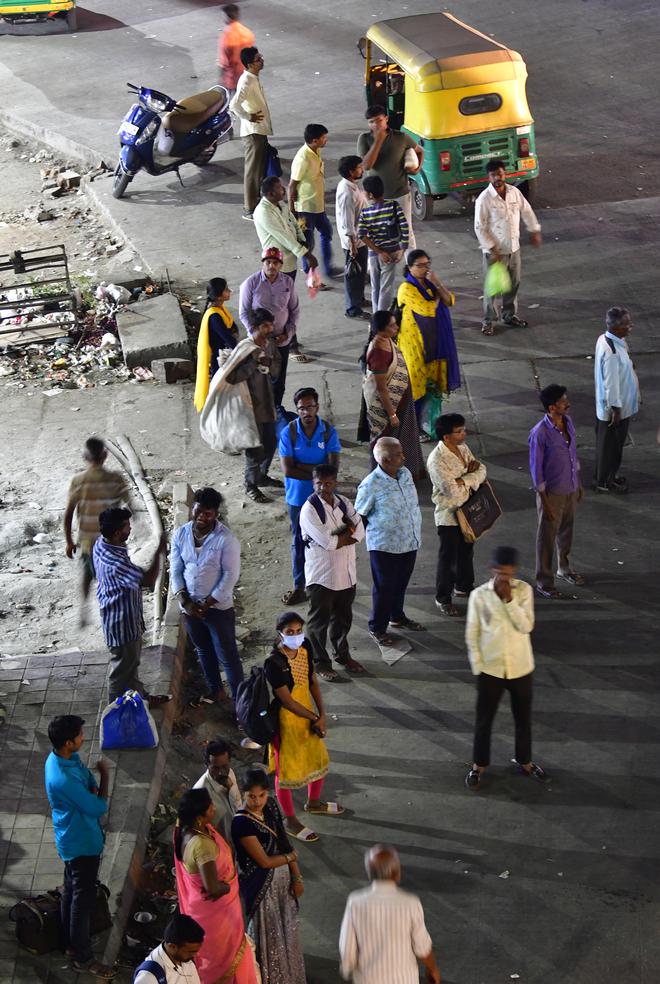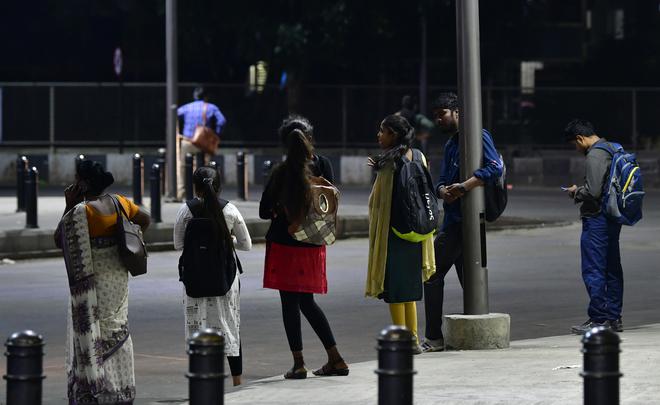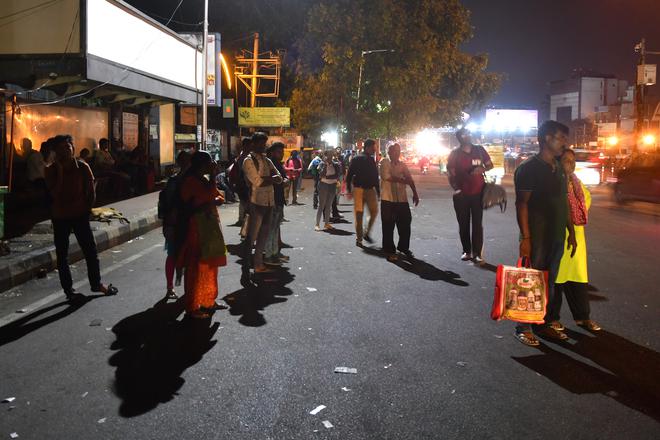Finding a city bus to travel at night is a harrowing experience for people who work late hours or those who arrive in the city after long-distance travel. Chethan Kumar, who works in a restaurant near Sahakarnagar said, “After finishing work around 11 p.m., I rush to Kodigehalli Gate bus stand to catch a bus that goes towards Devanahalli. At night, the frequency of buses is not good. After getting down near Bagalur Cross, I walk for 2 km to reach home. There are hardly any buses on Bagalur Main Road at night. It is extremely difficult for those who work till late night to rely on city buses.”
According to the information shared by the Bangalore Metropolitan Transport Corporation (BMTC), the corporation operates 59 schedules from 7 p.m. to 6 a.m. as night service buses. Officials claim that the ‘night out’ service of the corporation, operated between 2 p.m. and 2 p.m. (next day), caters to the demand of people travelling at night. A total of 2,615 buses are operated in this shift. The BMTC has a fleet size of 6,767 buses out of which 5,563 buses are operated daily.
When asked about complaints by passengers on the lack of adequate bus services at night, a BMTC official said, “We are providing bus services as per the demand. We do not see much demand for night services. The operational cost of running a bus is more than ₹65 per km. But in most of the services operated at night, the earnings per km is not even ₹25. This is an indication that there is no demand.” To travel in night service buses, passengers pay one-and-a-half fare.

This, however, seems like a chicken and egg situation. The Bruhat Bengaluru Hotels’ Association and several retailers are keen that they be allowed to exercise the permission given by the State government to keep the establishments open for 24 hours. But they complain that it is not viable as people do not stay out due to lack of public transport at night-time. Meanwhile, already staff-crunched city police also do not allow establishments to stay open all through the night in view of safety concerns. They also cite lack of safe public transport at night-time.
Issues faced by women
Twenty-five-year-old Prakruthi R. waits for about 15 to 20 minutes every day at the Shivajinagar bus stand between 8.30 p.m. and 9 p.m. after work to catch a bus that goes towards Hebbal. Once the bus arrives, she is tasked with finding her way inside the bus among 20-30 other passengers who are eager to get a seat. Even though she chooses to board the bus from the door on the women’s side, the pushing and pulling are relentless in the night hours.

“As there are fewer buses at this time, people are cramped up in the ones that are available. Even though there are separate sections for men and women, in a crowded bus, it does not work like that. We have to deal with men sometimes leaning or falling on us and the conductor pushing his way through a group of women, which makes many of us feel uncomfortable,” Ms. Prakruthi said.
Just like her, many other women who travel by BMTC buses after 8.30 p.m. deal with multiple problems that come with the poor frequency of services. While starting points such as Shivajinagar or Kempegowda Bus Terminal might be safer for longer waits, given that the premises are always busy, waiting at bus stops where there are no shelters or sometimes not even street lights keeps women on their toes.
“Hebbal is a busy area but after 9 p.m. there are only a few women at the bus stop opposite the police station. While I wait there for 20 minutes or even more to catch a bus that goes towards Doddaballapur road, I have sometimes been catcalled by strangers and repeatedly persuaded by conductors of private buses to get aboard (even after telling them that I do not want to get into a private bus). Even at such a busy place, I have felt unsafe many times during the night hours,” said Jyothsna K., a private company professional in the city.
She added, “At the CRPF bus stop where I get off, there is nothing except for a bench. As this is not a stop where many people get off, there is not even basic signage in place. The drivers sometimes do not even stop the bus completely and I am forced to get off a slow-moving bus.”
At the mercy of auto and taxi drivers

The lack of feeder bus services from Namma Metro stations at night remains a concern for many passengers. “I usually take the metro up to Indiranagar to go to Vigyan Nagar as there are no feeder services or regular buses from S.V. Road metro station or Baiyappanahalli station to my area. If I reach after 9 p.m., I am at the mercy of auto or taxi drivers. I once reached at 9.30 p.m. and stood there till 10.30 p.m. It was a harrowing experience because there are no buses to other areas also and we are just stuck at the bus stop so late in the night. Even though the population has exploded in areas around where I stay, the bus frequency is as pathetic as it used to be 10 years ago, especially late at night. How should people who do not work 9 a.m. to 5 p.m. travel if public transport so blatantly refuses to cater to them? Bengaluru is a booming city with so many types of industries and service sectors. The government should be thinking of making the public transport system more robust and safer instead of focusing only on major infrastructure projects. This will even help reduce traffic to a large extent,” said Praneetha.
No awareness about bus tracking app
After missing several deadlines, the BMTC recently launched the app, ‘Namma BMTC’. It helps passengers to live track buses and plan their travel. However, not many commuters are aware of this app yet. “When Tummoc (a ticketing app) was launched, they put up QR codes in buses which led many of us to ask and find out what it was. But nothing of the sort has been done for this app. I was not even aware that we could track buses. Being able to know when the bus will reach our stop will help us plan our journey and reach the stop a few minutes before that to avoid a lot of hassle,” said Ms. Prakruthi when asked about the new app.
Concerns of bus crew
It is not just bus passengers but even BMTC bus crew say reaching home is a problem after completing their shift.
Rekha (name changed), who works as a conductor, reaches home at about 11.30 p.m. after a tiring shift. She said, “I have been working on the Shivajinagar–Banashankari route for the last two years. It’s a difficult job, but I have been managing it somehow. There are no issues related to safety and the BMTC does not allow women conductors to work in midnight shifts. Every day, after my shift ends around 10 p.m., I have to go to the depot to deposit cash at the collection counter. This takes time and I reach home around 11.30 p.m. My family is worried till I reach home.”
Apart from the safety issue, women conductors face a lot of other problems, including the lack of proper washrooms at bus stations and at the Traffic Transit Management Centres (TTMC). “The washrooms at bus stands are not in good shape. Everyone says that we should drink more water for good health, but how can we do that in such a scenario? I do not drink enough water so as to avoid using the dirty washrooms at the TTMC or bus station,” said Lakshmi (name changed), a conductor.
Meanwhile, male staff members who start their work early in the morning have their own set of problems. Vijaya Kumar (name changed) has to start his duty at 4 a.m. from Majestic bus station towards Jigani. He usually goes to the depot the previous night and stays there till 4 a.m. “I have very little time with my family since I have to rush back to the depot to start my shift early in the morning. There are no bus services after midnight and I can’t reach the depot early in the morning. So I come the previous night, sleep in the depot and start duty.”
Many rely on private vehicles
The absence of night service buses has forced people to rely on private maxi cabs and vans in several parts of the city. Those who work in unorganised sectors are forced to pay hefty fares to travel in these vehicles that illegally ferry passengers. At several locations in the city, including Banashankari, Goraguntepalya, Silk Board, Hebbal, K.R. Market, Hosur Road, and Tin Factory, people waiting for buses often end up travelling by such private vehicles.

Chikkatayamma, a vegetable vendor from Ullal Upanagara who was waiting for a bus at K.R. Market, said, “It is difficult to get a bus after 9.30 p.m. Not all people cannot afford to go in an autorickshaw or private transport. I request the authorities to run more buses for the benefit of the common people.”
Kumar, driver of a private van who usually waits for passengers near Banashankari bus stand, said, “I provide cab service to a private firm at Electronics City and I reside at Laggere. On the way back home, I pick up passengers who look for a drop. A good number of people use private vehicles at night to reach home.”
An official of the BMTC said the corporation has been regularly writing to the Police and Transport departments to initiate action against private operators for ferrying passengers.







